If your dog has not pooped in 24 hours after diarrhea, you may be wondering what to do. Diarrhea is often caused by a change in diet or stress, and it can be very uncomfortable for your dog.
If your dog has gone more than 24 hours without pooping, it is definitely a cause for concern. When a dog experiences diarrhea, it often means that it will not poop for a while afterward because its digestive system is still trying to recover.
If your dog has not had a bowel movement in over 24 hours, there are several things you can do to help get them going again. In this blog post, we will discuss what to do if your dog hasn’t pooped in 24 hours after diarrhea.
Key Takeaway
- If your dog hasn’t pooped in 24 hours after diarrhea, this could be due to their digestive system being “cleaned out” and it may take a few days for normal bowel movements to resume, but if they’re not straining and are eating normally, there’s usually no cause for alarm.
- If this continues for more than 48-72 hours, you should consult with a vet.
Dog Hasn’t Pooped in 24 Hours After Diarrhea – Do This!
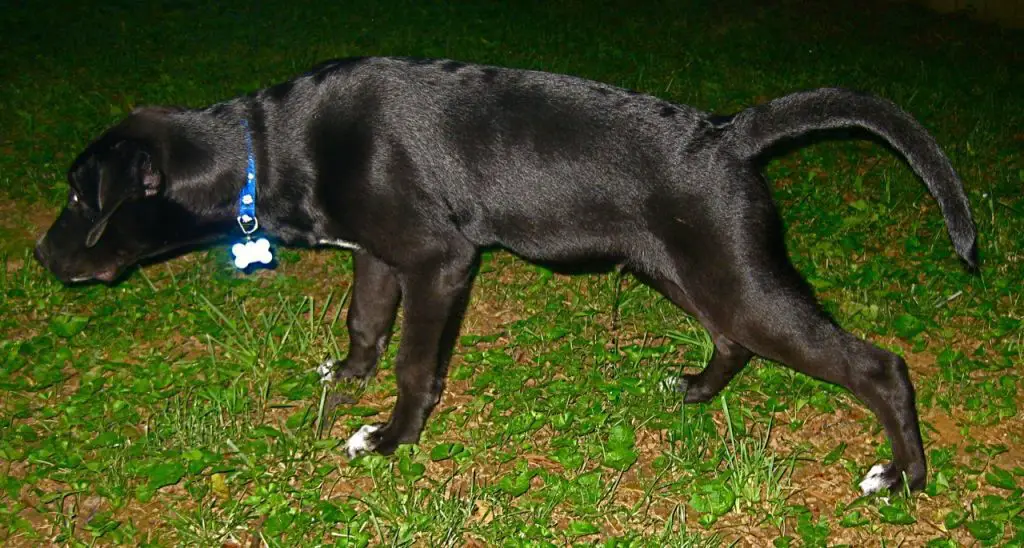
Diarrhea is defined as an increase in the frequency, volume, and/or water content of stools. It can be acute, meaning it comes on suddenly and lasts for a short time, or chronic, meaning it lasts for weeks or even months. Diarrhea can also be mild or severe.
The most common cause of diarrhea in dogs is a change in diet. If you switch your dog’s food abruptly, his digestive system may not be able to adjust and this can lead to loose stools.
Eating something that disagrees with him can also cause diarrhea. After diarrhea has passed, many dogs don’t start pooping normally right away.
There are a few things you can do if your dog hasn’t pooped in 24 hours after diarrhea.
1. Keep them hydrated
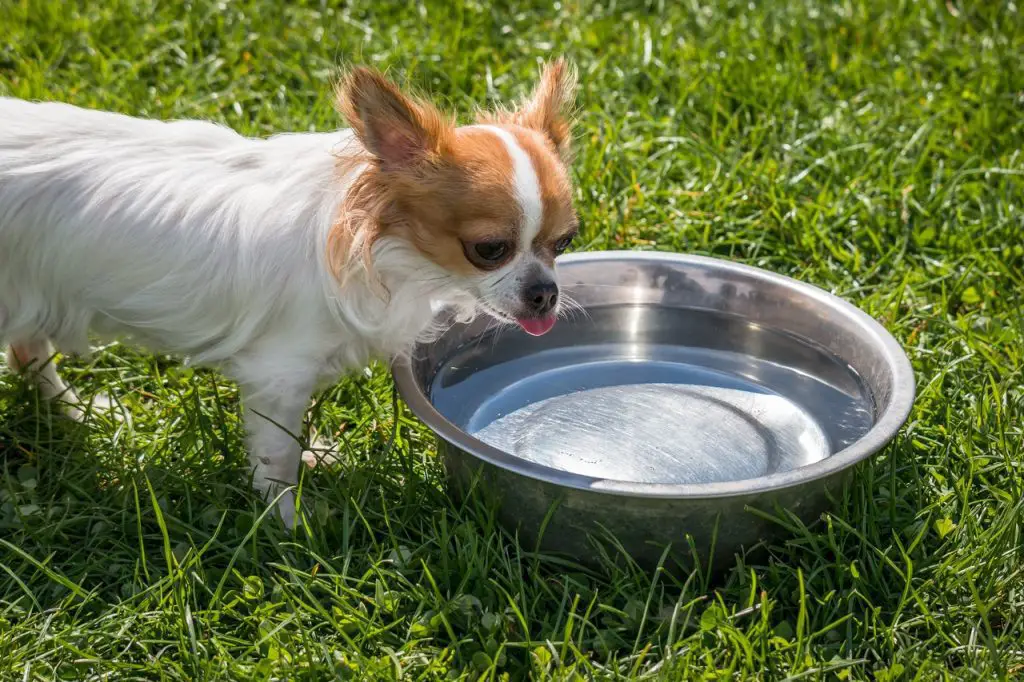
Water is necessary for several reasons in a dog’s digestive system. It aids in the breakdown of food, helps to move food through the intestines, and also prevents constipation.
Without enough water, the digestive system can’t function properly and your dog may become sick. Make sure your dog always has access to fresh, clean water, and encourage him to drink throughout the day.
As a general rule of thumb, most dogs should drink around 8 ounces of water per pound of body weight each day. So, for example, a 20-pound dog would need to drink approximately 160 ounces (or 10 cups) of water per day.
Electrolytes are important for dogs because they help to maintain hydration, regulate body temperature, and support muscle function. Without enough electrolytes, dogs can become dehydrated, overheat, and experience muscle weakness.
Therefore, it is important to make sure that your dog has plenty of electrolytes in their diet.
A great way to give your dog electrolytes to keep them hydrated is by giving them electrolyte-rich drinks. During diarrhea, the dog will basically expel everything in its bowels. This is why it is important to hydrate them.
2. Feed them bland, easily digestible foods
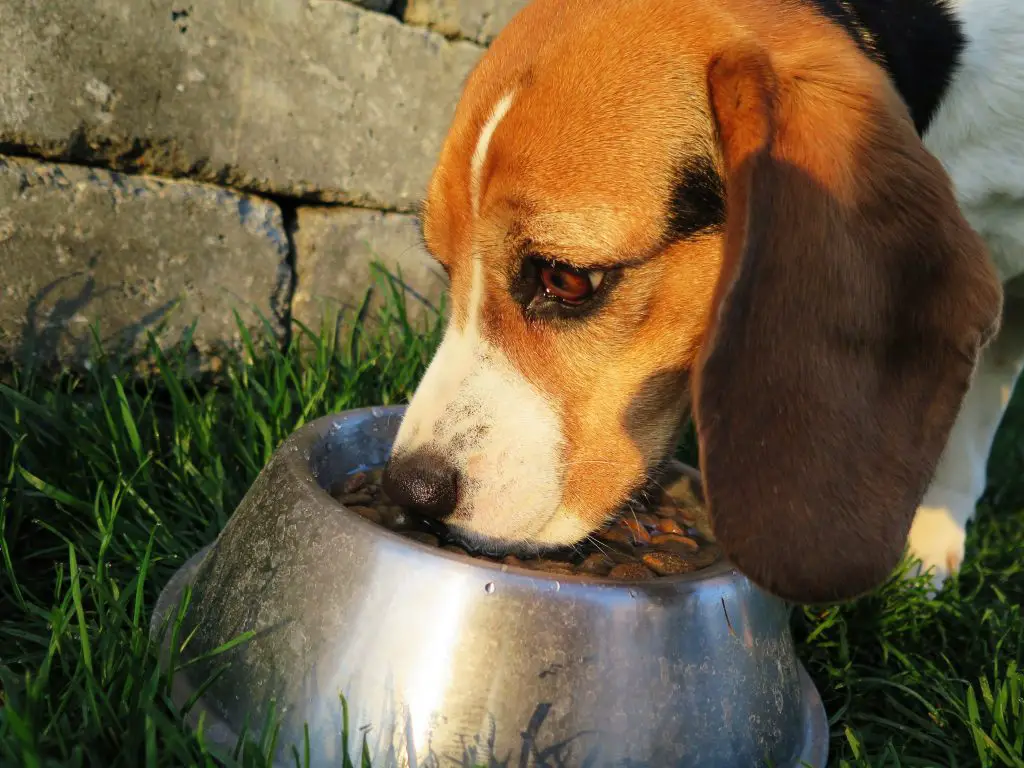
There are a few different types of food that can help dogs with diarrhea. Bland, easily digestible foods like boiled chicken or rice can help to soothe an upset stomach and firm up stool.
Adding probiotics to your dog’s diet can also be helpful in restoring balance to their digestive system. Lastly, make sure your dog is getting enough fiber by adding canned pumpkin or other high-fiber foods to their meals.
One of the most common questions that pet parents ask is whether white rice is good food for their dog with diarrhea.
The answer is yes! White rice is an easily digestible carbohydrate that can help to firm up your dog’s stool and ease gastrointestinal upset. Plus, it’s a bland food that is unlikely to aggravate your dog’s sensitive stomach.
If your dog is suffering from diarrhea, adding white rice to their diet is a simple way to provide some relief and get them back on track.
3. Visit the vet
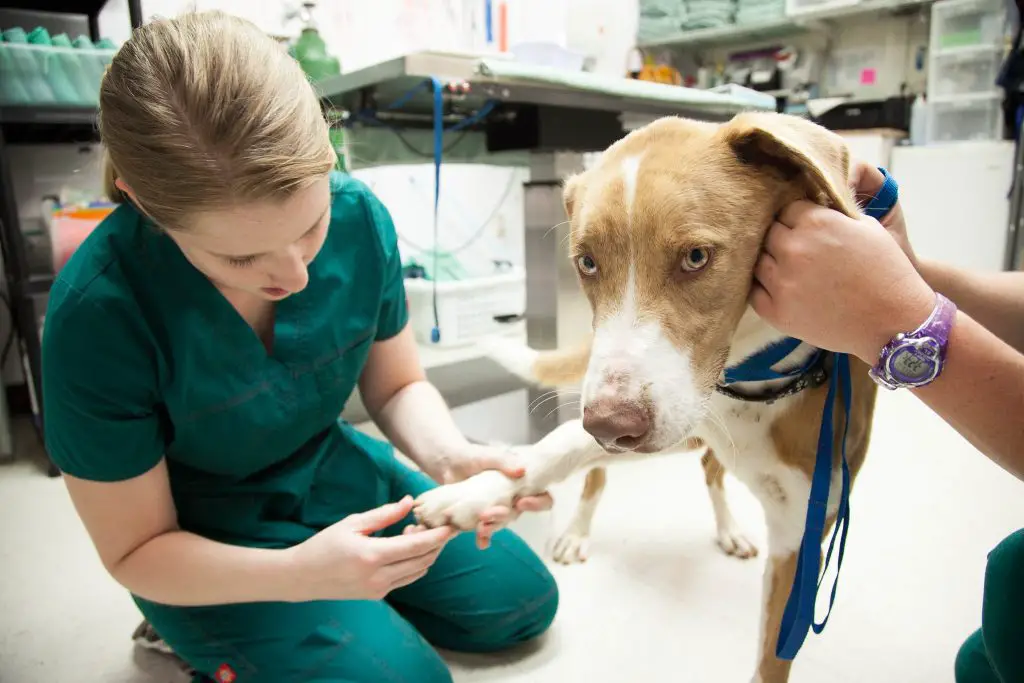
If your dog has diarrhea, it’s important to monitor their stool closely. If they haven’t pooped in 24 hours, this could be a sign of dehydration or an obstruction.
Your vet can help by performing a physical examination and ordering diagnostic tests, such as X-rays or blood work. They will also be able to provide you with guidance on how to best care for your dog at home and when to seek medical attention.
If your dog has diarrhea and hasn’t pooped in 24 hours, it’s possible that something is blocking its intestine.
An x-ray can show if there’s anything blocking the intestine and may help to diagnose the cause of diarrhea. If your dog is showing any other signs of illness, such as vomiting, lethargy, or loss of appetite, you should take them to see a vet as soon as possible says Pet Cube.
What Are Some Common Causes of Dog Constipation?
Some common causes of dog constipation include ingestion of indigestible substances, lack of exercise, poor diet, sudden diet changes, blockages from eating non-food items, and conditions like prostate enlargement or previous pelvic fractures.
Ingestion of Indigestible Substances
As a veterinarian, I’ve seen many cases where dogs consume items that their digestive system can’t process, such as bones, toys, grass, or fabric pieces. These foreign objects can cause an obstruction in the intestines, leading to constipation.
Lack of Exercise
Physical activity is crucial for maintaining regular bowel movements in dogs. A sedentary lifestyle can slow down the digestive process, making it harder for dogs to pass stools.
Poor Diet or Sudden Diet Changes
A balanced diet rich in fiber is essential for a dog’s digestive health. A diet lacking in fiber or a sudden change in diet can disrupt their digestive system and lead to constipation.
Blockages from Eating Non-Food Items
Dogs are curious creatures and sometimes ingest non-food items like garbage. These can create blockages in their digestive tract, preventing normal bowel movements.
Prostate Enlargement or Previous Pelvic Fractures
Medical conditions such as an enlarged prostate or a history of pelvic fractures can also contribute to constipation in dogs. These conditions can physically obstruct the passage of stools, causing discomfort and difficulty in defecating.
How Long After Diarrhea Does a Dog Have a Bowel Movement?
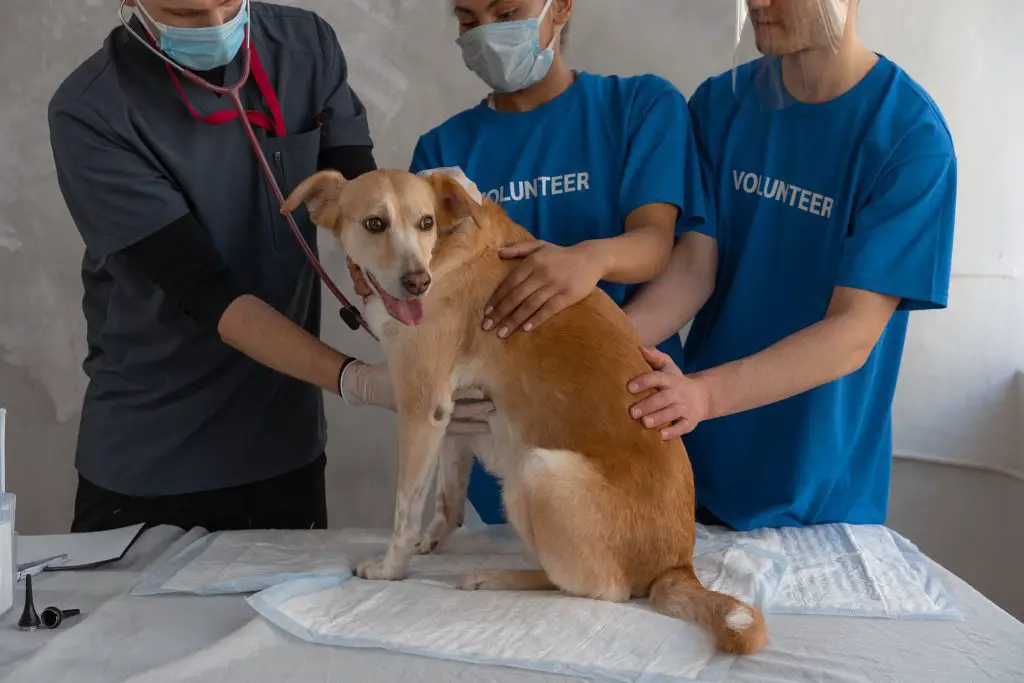
A dog typically has a bowel movement within 12 hours after experiencing diarrhea. However, some dogs may take up to 24 hours to have a normal bowel movement.
If your dog does not have a bowel movement within 24 hours, it is important to contact your veterinarian.
After a dog has had diarrhea, it is important to monitor its stool and make sure that it returns to normal. If diarrhea persists or your dog begins to show other signs of illness, please contact your veterinarian. It is also important to clean up any diarrhea messes quickly to prevent the spread of bacteria.
There are a few reasons why dogs may not have bowel movements after suffering from diarrhea. First, diarrhea may have been so severe that it has completely emptied the dog’s system. Second, the dog may be dehydrated from all the fluid loss and unable to produce solid stool.
Finally, the dog’s digestive system may be in such shock from the diarrheal episode that it is temporarily unable to function properly. If your dog has not had a bowel movement within 24 hours of having diarrhea, it is best to consult your veterinarian.
Is It Common For a Dog Not To Poop After Diarrhea?
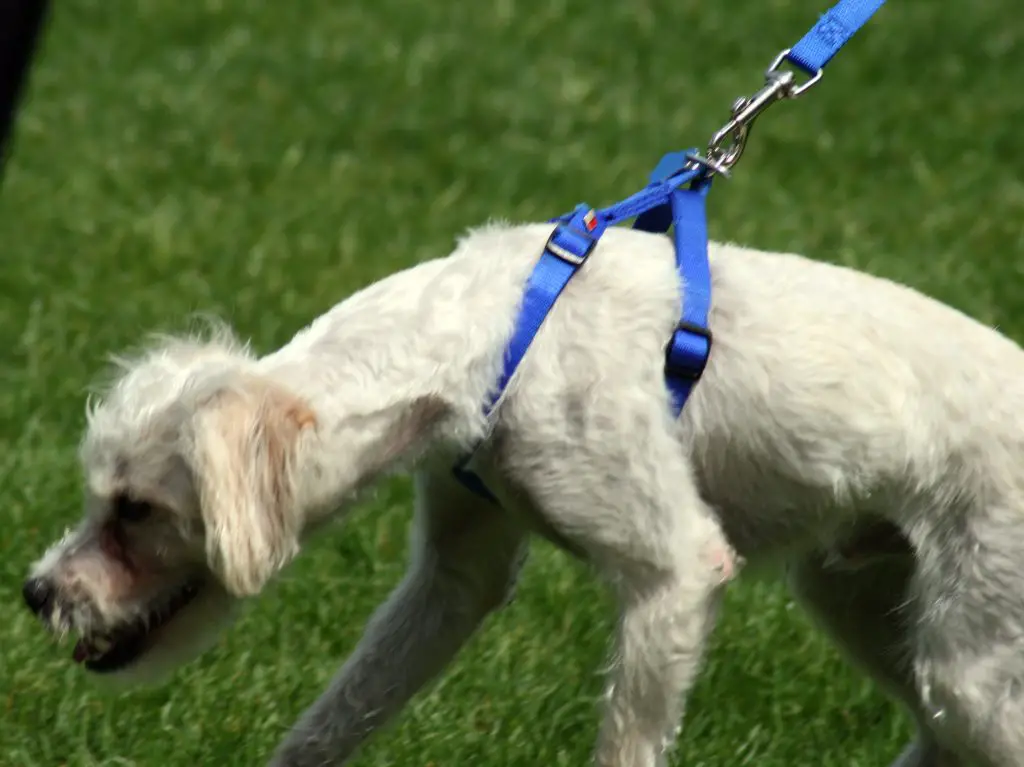
It is very common for dogs not to poop after experiencing diarrhea. One possibility is that the dog’s digestive system is still in the process of recovering and has not yet returned to normal function.
Additionally, some dogs may be hesitant or afraid to poop if they have had an unpleasant experience with it in the past, such as straining too hard or having pain while doing so.
Finally, some dogs may simply be holding in their stool out of a natural desire to keep their anal area clean. If your dog is experiencing any of these issues, it is best to consult with a veterinarian for guidance on how to proceed.
If your dog has diarrhea, there are a few things you can do to help them poop. First, make sure they have plenty of water to drink. This will help keep them hydrated and help their digestive system function properly.
You may also want to feed them a bland diet of boiled chicken and rice until their diarrhea subsides. Finally, take them out for frequent potty breaks so they can relieve themselves in a safe place. If your dog’s diarrhea persists for more than a day or two, consult your veterinarian.
Can Dogs Be Constipated After Diarrhea?
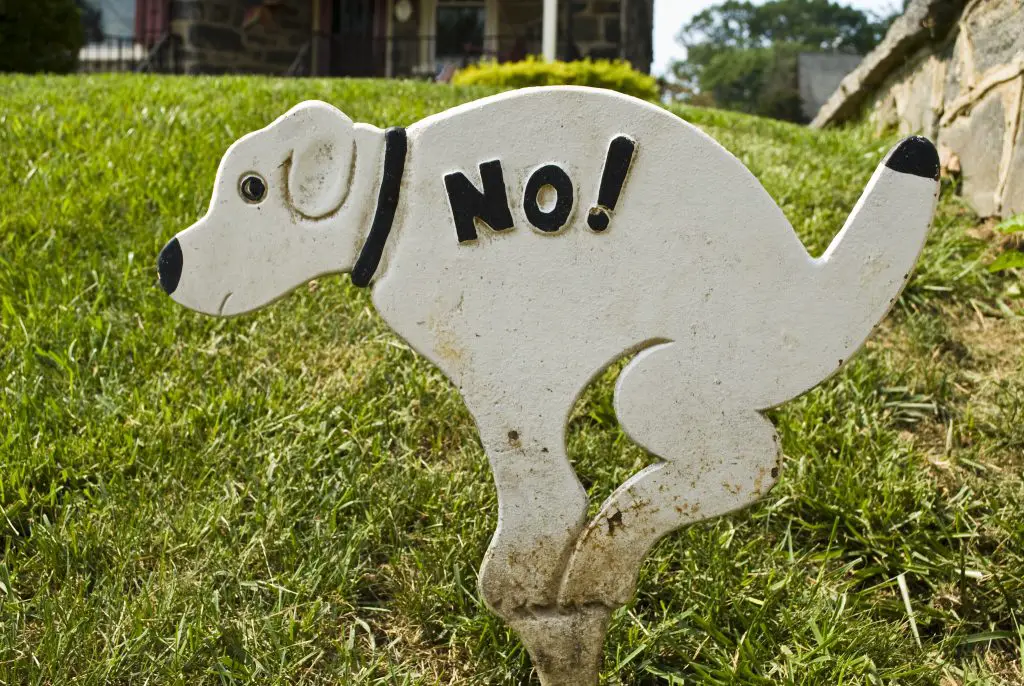
Dogs can indeed experience constipation after a bout of diarrhea, as the digestive system may take time to return to normal.
From my perspective as a veterinarian, this is not uncommon and is usually a temporary issue. After a dog has had diarrhea, their intestines can be emptied out, leading to a period where they don’t produce any stool. This can sometimes be mistaken for constipation.
However, true constipation involves difficulty in passing stools that are often hard and dry. This is less common after diarrhea, but it can happen if the dog becomes dehydrated or if their diet changes too quickly during the recovery process.
It’s important to reintroduce regular food gradually after a dog has had diarrhea, starting with bland, easily digestible foods.
In my practice, I’ve found that keeping the dog hydrated and maintaining a balanced diet can help prevent constipation after diarrhea.
But every dog is different, and if your pet continues to show signs of discomfort, lack of appetite, or doesn’t have a bowel movement for more than two days, it’s crucial to seek veterinary advice.
How Can I Differentiate Between Dog Constipation and The After Effects of Diarrhea?
| Constipation | After Effects of Diarrhea | |
|---|---|---|
| Bowel Movement Frequency | Decreased frequency, may strain to defecate with little or no results | May not have a bowel movement for a day or two due to intestines being cleared out |
| Stool Appearance | Hard, dry stools, often small and pebble-like | No stool present initially, then should gradually return to normal consistency |
| Behavioral Signs | Straining, discomfort or pain when trying to defecate, loss of appetite, lethargy | Normal behavior should resume once the diarrhea stops, including regular eating and activity levels |
| Physical Signs | Possible bloated abdomen, painful belly on palpation | Should not see physical discomfort or bloating after diarrhea subsides |
| Duration | Can be chronic if not addressed | Usually temporary, bowel movements should return to normal within a few days after the diarrhea ends |
| Treatment | Increased fiber in diet, hydration, possible vet-prescribed laxatives | Rehydration, bland diet, probiotics, returning to regular diet slowly |
How Do I Get My Dog To Poop After Diarrhea?
If your dog has had diarrhea, it is important to get him or her to poop as soon as possible. This will help remove any remaining toxins from the body and help the digestive system return to normal.
There are a few things you can do to encourage your dog to poop:
1. Take your dog for a walk
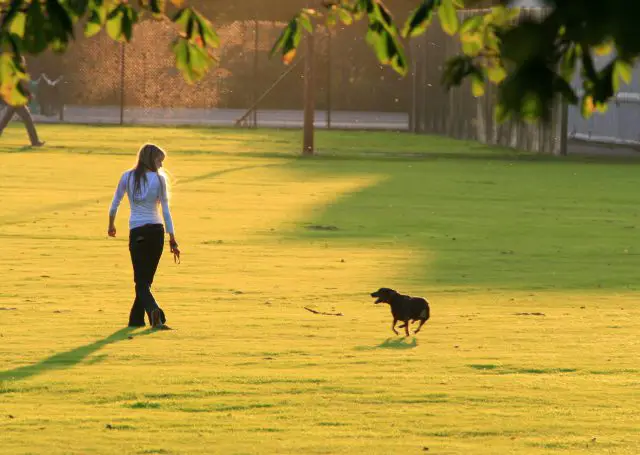
Walking is a great way to stimulate your dog’s bowel movements. Dogs typically need to go after they eat, drink, or exercise.
Walking helps to move their bowels along and can also help to relieve any constipation that may be present. If your dog is having trouble going, a short walk may be all they need to get things moving again.
2. Offer your dog high-fiber foods
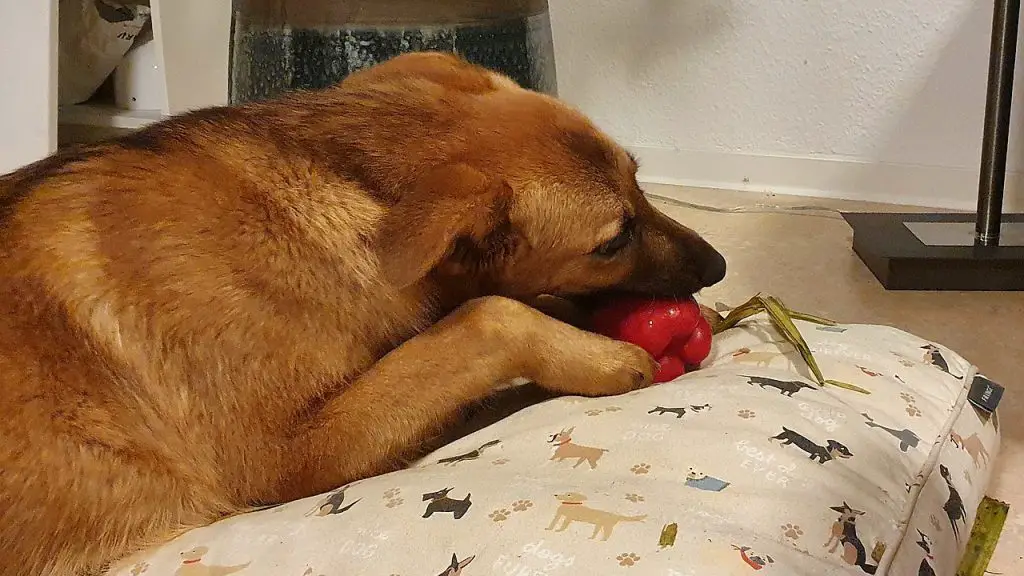
High-fiber foods stimulate bowel movements in dogs by increasing the amount of bulk in the stool. This added bulk helps to move stool through the intestines more easily and prevents constipation. High-fiber foods also add moisture to the stool, which can help to keep things moving along smoothly.
Some good high-fiber options for dogs include pumpkin, sweet potatoes, carrots, green beans, and peas. Adding a small amount of plain yogurt or psyllium husk powder to your dog’s food can also help to increase fiber intake.
3. Add a teaspoon of pumpkin puree to your dog’s food
Pumpkin puree is effective in stimulating bowel movements in dogs due to its high fiber content. Fiber helps to add bulk to the stool and also aids in digestion. Pumpkin puree is also a good source of moisture, which can help to soften the stool and make it easier to pass.
Pumpkin puree is rich in fiber, which can help promote regularity and prevent constipation. Fiber also helps to keep your dog feeling full after eating. One cup of pumpkin puree contains about 7 grams of fiber.
4. Give your dog a probiotic supplement
A probiotic supplement can stimulate bowel movements in dogs by introducing healthy bacteria into the digestive system. Probiotics help to break down food and absorb nutrients more efficiently, which can lead to softer stools and less constipation.
Many commercial dog foods contain probiotics, but you may need to give your dog a higher dose if he is suffering from chronic constipation. Consult your veterinarian for the best way to use probiotics to treat your dog’s constipation.
There are a lot of different probiotic supplements on the market for dogs, so it can be tough to choose which one is best for your pup. However, there are a few things you should look for when choosing a probiotic supplement for your dog.
First, make sure that the supplement contains live and active cultures. These are the beneficial bacteria that will help improve your dog’s gut health. Second, look for a supplement that contains a variety of different strains of probiotics. Different strains offer different benefits, so a mix of several different strains is ideal.
Finally, choose a supplement that is made specifically for dogs. Some human probiotic supplements may not be safe for dogs, so it’s important to find one that is formulated specifically for dogs.
FAQs
Q: How can I help my dog if it is constipated?
A: If your dog is constipated, you can try the following remedies: – Ensure your dog has access to fresh water to prevent dehydration. – Increase the dietary fiber in your dog’s food by adding canned pumpkin or a small amount of bran to their meals. – Encourage exercise to stimulate bowel movements. – Consult with a veterinarian for additional advice or potential medication.
Q: When should I seek veterinary help for my dog’s constipation?
A: If your dog’s constipation persists for more than 48 hours, is accompanied by severe pain or distress, or is recurrent, it is best to seek veterinary help. The vet will be able to determine the underlying cause and provide appropriate treatment.
Q: Should I be concerned if my dog shows other symptoms along with not pooping?
A: Yes, if your dog is not pooping and also exhibits other symptoms such as abdominal pain, bloating, vomiting, loss of appetite, lethargy, or unusual behavior, it is important to seek veterinary assistance. These symptoms could indicate a more serious underlying condition that requires medical attention.
Q: Can stress or changes in routine cause constipation in dogs?
A: Yes, stress or sudden changes in routine can disrupt a dog’s digestive system and potentially lead to constipation. It is important to provide a stable and consistent environment for your dog to help prevent digestive issues. If you suspect stress is the cause, try to identify and alleviate the source of stress, or consult with a veterinarian for guidance.
Q: Is it possible for a blockage or obstruction to cause both diarrhea and constipation in dogs?
A: Yes, in some cases, a blockage or obstruction in the digestive tract can cause both diarrhea and constipation. The blockage may partially obstruct the passage of stool, leading to constipation, while also allowing liquid stool to leak around it, resulting in episodes of diarrhea. If you suspect your dog has a blockage, it is crucial to seek immediate veterinary assistance.
Q: Can certain medications cause constipation in dogs?
A: Yes, certain medications, such as opioid pain medications, antihistamines, anti-nausea drugs, and some types of anesthesia, can have constipation as a side effect in dogs. If your dog is on any medications and showing signs of constipation, it is important to consult with your veterinarian to evaluate if the medication is the cause and determine the best course of action.
Q: How can I prevent constipation in my dog?
A: To help prevent constipation in your dog, you can: – Provide a balanced and high-fiber diet. – Ensure your dog has access to fresh water at all times. – Encourage regular exercise. – Avoid sudden changes in diet or routine. – Avoid giving your dog medications that can cause constipation without consulting with a veterinarian first.
Q: Can I give my dog over-the-counter laxatives for constipation?
A: It is not recommended to give over-the-counter laxatives or any human medications to your dog without consulting with a veterinarian. Some laxatives designed for human use can be toxic to dogs, and the proper dosage and type of laxative for a dog may be different. Always seek professional veterinary advice before administering any medications to your dog.
Conclusion and final thoughts
In conclusion, if your dog hasn’t pooped in 24 hours after experiencing diarrhea, it is important to closely monitor their behavior and make sure they are getting enough water.
It is also recommended to consult with a veterinarian for further guidance and potential treatment options.
Remember to always prioritize your dog’s health and well-being by seeking professional advice when needed.



